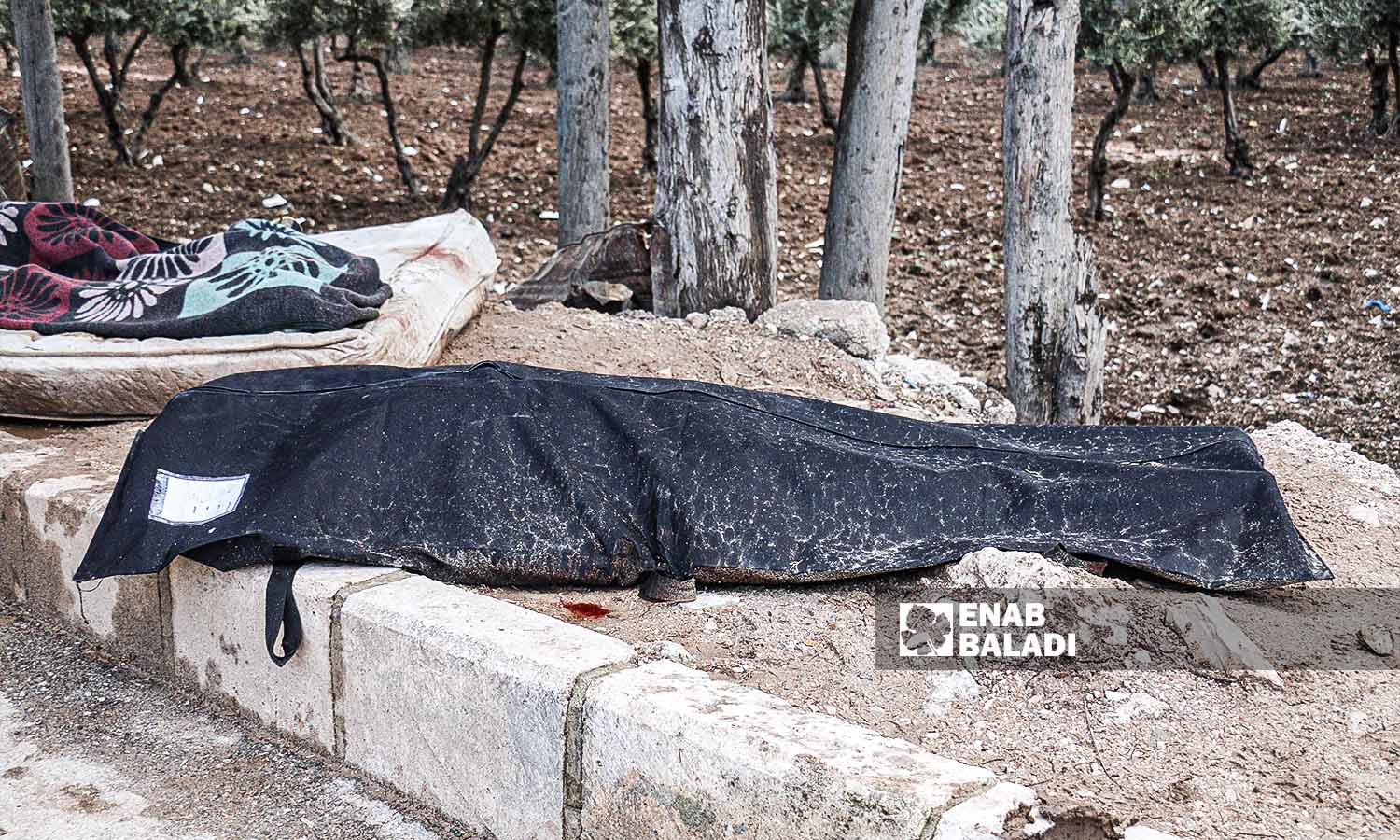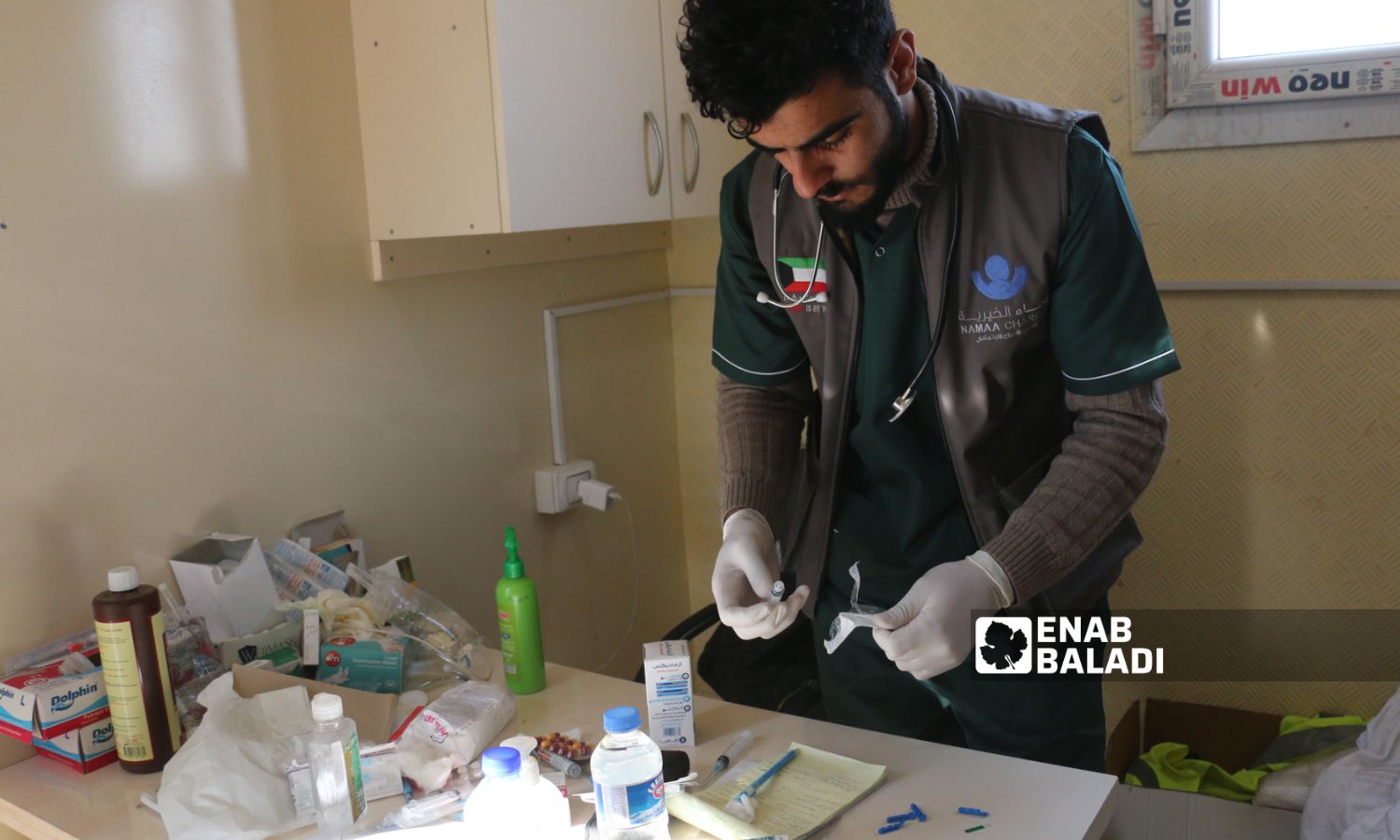



The smell of death permeates the town of Jindires in the northern countryside of Aleppo, despite the halt of search and rescue operations for people trapped under the rubble and the start of search and recovery operations as a result of the massive earthquake that struck the area since February 6, leaving over 40,000 people dead.
Unidentified corpses were placed on sidewalks waiting for people to recognize them, and mass graves that included entire families left traces of sadness and calm in the stricken town.
Five days after the arrival of volunteers from local organizations and citizens in attempts to save those who could be saved, cars loaded with food and medical supplies, clothes, and tents arrived in the town after campaigns of support and donations launched by activists and people in neighboring cities, towns and villages less affected by the earthquake.
The UN aid trucks also crossed into northern Syria from the Bab al-Hawa and Bab al-Salama border crossings with Turkey, but Jindires residents are still in shelters and makeshift tents, in need of many services, as is the case with dozens of towns and villages that were affected by the 7.7 magnitude earthquake and its aftershocks.
On February 10, the Syria Civil Defense (SCD) organization announced the end of search and rescue operations for those trapped under the rubble in the quake-hit areas in northwestern Syria and the start of search and recovery operations after almost no survivors.
The statistics of the victims to which the White Helmets responded amounted to more than 2,170 deaths and more than 2,950 injured people in more than 40 towns and villages in northwestern Syria, in which about 550 residential buildings were completely destroyed, and more than 1,570 buildings were partially damaged.
The largest toll was in the town of Jindires, where the number of victims reached more than 513 deaths and 831 injuries.
With dozens of unidentified corpses in the town, the bodies of the earthquake victims are initially transferred to the mortuary refrigerators, but when the refrigerators are full, the corpses are transferred to the vicinity of the Afrin Military Hospital, where dozens of corpses are piled up.
The commander of the military police in Jindires, Ibrahim al-Jassem, told Enab Baladi on February 9 that the number of unidentified bodies in the town exceeded 90.
Al-Jassem pointed out that the statistic does not include dozens of corpses that were transported to Idlib to be buried there.
Regarding the mechanism of dealing with the earthquake victims, al-Jassem says that the bodies are placed for hours near the demolished buildings from which they were taken out, waiting for their families to identify their victims so that they can be handed over to them directly.
Al-Jassem added that the unidentified bodies remain in the mortuary refrigerators after publishing their photos on social media in search of their relatives.
After 48 hours, the forensic medicine department takes over the burial process after giving each body a special number that is kept with pictures of it from several sides, to be buried later in the available cemeteries.
The burial office in the town told Enab Baladi that it worked on washing and shrouding the corpses (according to the Islamic Shariah) so that the people would be able to identify them, pointing out that dozens of corpses are still unidentified.
The burial office works to document the bodies by taking pictures of them so that the people can identify them and receive them for burial directly.
In his turn, Yazan al-Nasser, deputy head of the local council in Jendires, said that the police command is the official body responsible for organizing burials and documenting information about the victims.
Pointing out that the council directed a specialized team to supervise burial and documentation operations.
Cars loaded with foodstuffs, medical supplies, clothes, and tents arrived in Jendires, including clothes, blankets, canned food, tents, and bread.
After donation campaigns, the people of neighboring villages launched an appeal to donate or collect in-kind materials such as sugar and saline serums, sterilizers, splints, sterile gauze, wrapping gauze, antibiotics, intravenous cetamol, tramadol, surgical sutures, and other medical materials.
In the camps near Jindires, in which the townspeople took refuge after the earthquake, there is a hangar that serves as a clinic, providing medical services to the affected people, as an initiative launched by nurses to help the people.
Redha Mohammad, a nurse in the clinic, told Enab Baladi that the clinic provides medical services, such as examinations and giving medicines to some affected families, in cooperation with the Namaa Charity and Insan associations operating in the northern region.
Mohammad, a graduate and an emergency specialist from the University of Idlib, said that the clinic receives at least 250 to 300 cases daily, in addition to a field visit by nurses to the affected families every day, from morning to evening.
The medic added that he deals with critical cases due to his work experience in hospitals for four years and provides non-specialized medicines to patients, such as painkillers and anti-inflammatory drugs.
Mohammad also deals in the field with fracture fixation and wound dressing cases, pointing out that the clinic lacks pediatric and gynecology specialists, and there is also a shortage of medicines.

A medic inside a mobile clinic in Jindires in the northern countryside of Aleppo, providing medical services to the people affected by the earthquake that struck southern Turkey and northwestern Syria – February 11, 2023 (Enab Baladi/Dayan Junpaz)
In the latest statistics published by the Jindires Local Council on February 9, it stated that the number of serviced families in tents is 515, while the number of unserved families is 2,692, the number of damaged buildings is 1,100, and the number of completely demolished buildings is 257.
The town needs to distribute relief materials, secure health centers and mobile clinics, and secure a medical center that provides services for advanced cases, according to the local council.
It is also in need of securing baby food and milk, mothers’ supplies and providing care for them, securing water and shelters for affected families, opening roads, and removing rubble.
if you think the article contain wrong information or you have additional details Send Correction